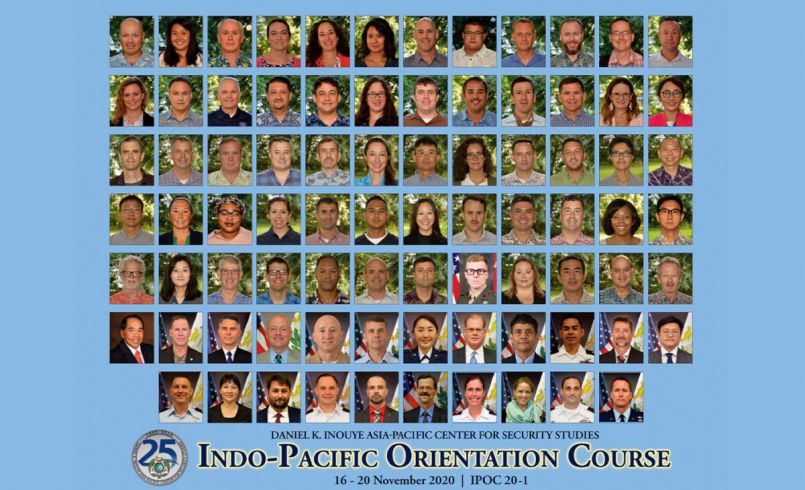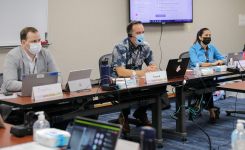- Daniel K. Inouye Asia-Pacific Center for Securi...
- Congratulations IPOC 20-1
Congratulations IPOC 20-1
The Daniel K. Inouye Asia-Pacific Center for Security Studies (DKI APCSS) reopened its doors Nov. 16 to welcome 60 Fellows attending the Indo-Pacific Orientation Course (IPOC) 20-1 from.
IPOC 20-1, a highly sought after executive education experience for U.S. security practitioners, spanned an intensive week of discussions and applied learning activities on key security issues and trends affecting the Indo-Pacific region. The course ended Nov. 20.
The course design used teaching methodologies centered on transformative learning. To adjust for the COVID-19 pandemic, the course management team, led by Dr. James M. Minnich, designed the course as a five-day hybrid program of in-resident and virtual online components. This course design used an active learning technique called “flipped learning” to allow Fellows to prepare for each of the plenary sessions by engaging in professors’ asynchronous video lectures that were pre-recorded and uploaded for Fellows on the Center’s ILIAS Learning Management System (LMS). After viewing the asynchronous content in self-study, Fellows engaged each other in an online discussion forum to prepare for daily in-resident plenary discussions with their professors. Professor-led discussions on each plenary topic were immediately followed by seminar classes where faculty facilitated small group discussions and applied learning activities with the Fellows.
The key to the success of this course lay in its transference of cutting edge information, self-reflection, and collective critical thinking. Fellows were encouraged to critically reflect on information learned through the course as they were invited to consider underlying assumptions about their worldviews. To that end, IPOC 20-1 offered 21 topical sessions that addressed the course terminal learning objective to provide an executive education experience that prepared U.S. security practitioners to knowledgably engage in cooperative security efforts that build capacity to advance a free and open Indo-Pacific where all recognize the linkages between good governance, rules-based order, and security.
During the course, fellows examined strategic approaches to the Indo-Pacific by the United States, its partner nations – Australia, India, and Japan – and its competitors – China and Russia. Framed by a common understanding of the geopolitical landscape and security architecture of the Indo-Pacific, the course then explored the four sub-regional dynamics of Northeast Asia, Southeast Asia, South Asia, and Oceania. Predicated on the proposition that a free and open Indo-Pacific is contingent on national-levels of good governance, the course concluded with an in-depth examination of the six security spheres of economics, gender, maritime, health, environment, and cyber.
The course objectives aligned with the Center’s Congressional mandate in U.S. Code Title 10 Section 342, and Department of Defense Directive 5200.41E by “offering executive-development strategic-security studies,” and “developing and sustaining relationships and communities of interest among security practitioners and national security establishments.”
IPOC is a formal course at DKI APCSS that follows a model of participant-centered learning. The center is a Department of Defense institute that addresses regional and global security issues. Military and civilian security practitioners, from the United States and throughout the region, participate in the Center’s broad offering of comprehensive security programs of executive education, professional exchanges, and outreach events that are offered in Hawaii and throughout the Indo-Pacific.
The Center supports U.S. Indo-Pacific Command by developing and sustaining relationships among security practitioners and national security establishments throughout the region. The mission of DKI APCSS is to build resilient capacity, shared understanding, and networked relationships among civilian and military practitioners and institutions to advance a free and open Indo-Pacific. Since opening in 1995, more than 14,000 alumni from over 136 locations have attended DKI APCSS courses and workshops.
Related: Addition IPOC20-1 photos can be found on the DKI APCSS Facebook page - https://www.facebook.com/media/set/?vanity=DKIAPCSS&set=a.10158582533143913



